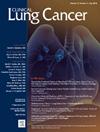A Phase I Open-Label Study of Cediranib Plus Etoposide and Cisplatin as First-Line Therapy for Patients With Extensive-Stage Small-Cell Lung Cancer or Metastatic Neuroendocrine Non–Small-Cell Lung Cancer
IF 3.3
3区 医学
Q2 ONCOLOGY
引用次数: 0
Abstract
Introduction
Small cell lung cancer (SCLC) is known to express high levels of the proangiogenic factor vascular endothelial growth factor (VEGF). We assessed the safety and tolerability of cediranib, an oral inhibitor of VEGF receptor tyrosine kinases, in combination with etoposide and cisplatin as first-line therapy for extensive-stage (ES) SCLC or metastatic lung neuroendocrine cancer (NEC).
Methods
Patients received up to six 21-day cycles of etoposide (100 mg/m2, days 1-3) and cisplatin (80 mg/m2, day 1) with once-daily cediranib until disease progression or unacceptable toxicity. Cediranib dosing started at 30 mg with de-escalation cohorts planned based on cycle 1 dose-limiting toxicities (DLTs). An expansion cohort of 12 patients was enrolled at the recommended phase II dose.
Results
Twenty-two patients (18 with ES SCLC, 4 with NEC) received treatment. Only 4 patients were enrolled at the 30 mg cediranib dose before other studies established 20 mg/day as the recommended dose with chemotherapy. Among the 18 patients enrolled at the 20-mg dose, common adverse events included nausea/vomiting, neutropenia, and diarrhea; 8 patients (44%) had grade 1 or 2 hypertension, and 2 (11%) had grade 3 hemoptysis. For all 18 patients, the objective response rate and median progression-free survival duration were 67% and 7.9 months. Plasma levels of VEGF were significantly higher, and those of soluble VEGFR2 were significantly lower, on day 22 than at baseline but were not correlated with tumor shrinkage.
Conclusions
Cediranib (20 mg) plus etoposide and cisplatin is well tolerated and has promising clinical activity.
塞地拉尼联合依托泊苷和顺铂作为广泛期小细胞肺癌或转移性神经内分泌非小细胞肺癌患者一线疗法的 I 期开放标签研究
众所周知,小细胞肺癌(SCLC)表达高水平的促血管生成因子血管内皮生长因子(VEGF)。我们评估了血管内皮生长因子受体酪氨酸激酶口服抑制剂西地尼布联合依托泊苷和顺铂作为广泛期(ES)SCLC或转移性肺神经内分泌癌(NEC)一线疗法的安全性和耐受性。患者最多接受6个21天周期的依托泊苷(100毫克/米,第1-3天)和顺铂(80毫克/米,第1天)治疗,同时每天服用一次西地尼布,直到疾病进展或出现不可接受的毒性。西地尼布的剂量从 30 毫克开始,并根据第一周期的剂量限制性毒性(DLT)计划降级队列。12名患者组成的扩大队列以推荐的II期剂量入组。22 名患者(18 名 ES SCLC 患者,4 名 NEC 患者)接受了治疗。在其他研究确定20毫克/天为化疗推荐剂量之前,只有4名患者以30毫克西地尼布剂量入组。在18名接受20毫克剂量治疗的患者中,常见的不良反应包括恶心/呕吐、中性粒细胞减少和腹泻;8名患者(44%)出现1级或2级高血压,2名患者(11%)出现3级咯血。所有18名患者的客观反应率和中位无进展生存期分别为67%和7.9个月。与基线时相比,第22天的血浆VEGF水平明显升高,可溶性VEGFR2水平明显降低,但与肿瘤缩小无关。塞地拉尼(20 毫克)加依托泊苷和顺铂的耐受性良好,临床活性也很好。
本文章由计算机程序翻译,如有差异,请以英文原文为准。
求助全文
约1分钟内获得全文
求助全文
来源期刊

Clinical lung cancer
医学-肿瘤学
CiteScore
7.00
自引率
2.80%
发文量
159
审稿时长
24 days
期刊介绍:
Clinical Lung Cancer is a peer-reviewed bimonthly journal that publishes original articles describing various aspects of clinical and translational research of lung cancer. Clinical Lung Cancer is devoted to articles on detection, diagnosis, prevention, and treatment of lung cancer. The main emphasis is on recent scientific developments in all areas related to lung cancer. Specific areas of interest include clinical research and mechanistic approaches; drug sensitivity and resistance; gene and antisense therapy; pathology, markers, and prognostic indicators; chemoprevention strategies; multimodality therapy; and integration of various approaches.
 求助内容:
求助内容: 应助结果提醒方式:
应助结果提醒方式:


